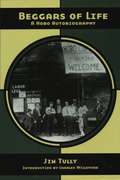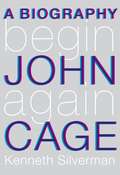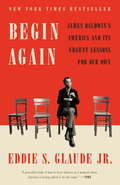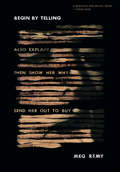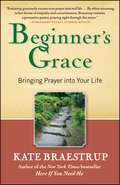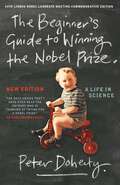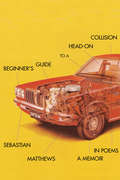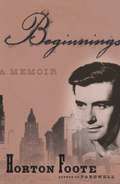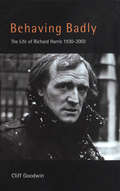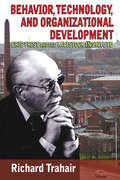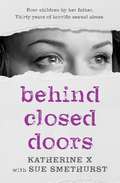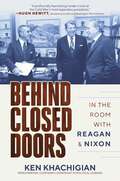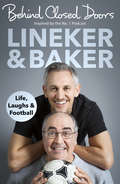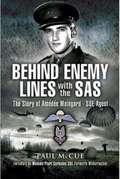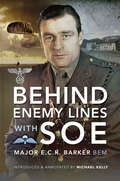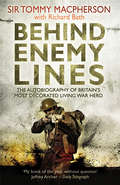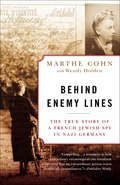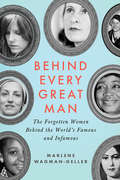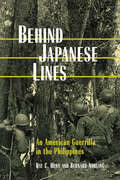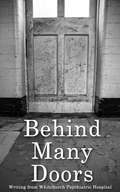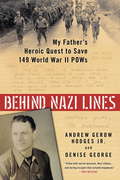- Table View
- List View
Beggars of Life: A Hobo Autobiography
by Jim TullyA bestseller in 1924, this vivid piece of outlaw history has inexplicably faded from the public consciousness. Jim Tully takes us across the seamy underbelly of pre-WWI America on freight trains, and inside hobo jungles and brothels while narrowly averting railroad bulls (cops) and wardens of order. Written with unflinching honesty and insight,Beggars of Life follows Tully from his first ride at age thirteen, choosing life on the road over a bdeadening job, through his teenage years of learning the ropes of the rails and -living one meal to the next. Tully’s direct, confrontational approach helped shape the hard-boiled school of writing, and later immeasurably influenced the noir genre. Beggars of Life was the first in Tully’s five-volume memoir, dubbed the "Underworld Edition," recalling his transformation from road-kid to novelist, journalist, Hollywood columnist, chain maker, boxer, circus handyman, and tree surgeon. Jim Tully(1891-1947) was a best-selling novelist and popular Hollywood journalist in the 1920s and ’30s. Known as "Cincinnati Red" during his years as a road-kid, he counted prizefighter and publicist of Charlie Chaplin among his many jobs. He is considered (with Dashiel Hammett) one of the inventors of the hard-boiled style of American writing. In Oakland, California on March 24, 2015 a fire destroyed the AK Press warehouse along with several other businesses. Please consider visiting the AK Press website to learn more about the fundraiser to help them and their neighbors.
Begin Again: A Biography of John Cage
by Kenneth SilvermanJohn Cage was a man of extraordinary and seemingly limitless talents: musician, inventor, composer, poet. He became a central figure of the avant-garde early in his life and remained at that pinnacle until his death in 1992 at the age of eighty. Now award-winning biographer Kenneth Silverman gives us the first comprehensive life of this remarkable artist. We follow Cage from his Los Angeles childhood--his father was a successful inventor--through his stay in Paris from 1930 to 1931, where immersion in the burgeoning new musical and artistic movements triggered an explosion of creativity in him and, after his return to the States, into his studies with the seminal modern composer Arnold Schoenberg. We see Cage's early experiments with sound and percussion instruments, and watch as he develops his signature work with prepared piano, radio static, random noise, and silence. We learn of his many friendships over the years with other composers, artists, philosophers, and writers; of his early marriage and several lovers, both female and male and of his long relationship with choreographer Merce Cunningham, with whom he would collaborate on radically unusual dances that continue to influence the worlds of both music and dance. Drawing on interviews with Cage's contemporaries and friends and on the enormous archive of his letters and writings, and including photographs, facsimiles of musical scores, and Web links to illustrative sections of his compositions, Silverman gives us a biography of major significance: a revelatory portrait of one of the most important cultural figures of the twentieth century. The book contains 11 URLs which take you to the publisher's website where you can hear excellent recordings of excerpts from several of Cage's compositions.
Begin Again: James Baldwin's America and Its Urgent Lessons for Our Own
by Eddie S. GlaudeJames Baldwin grew disillusioned by the failure of the civil rights movement to force America to confront its lies about race. In our own moment, when that confrontation feels more urgently needed than ever, what can we learn from his struggle? <P><P>We live, according to Eddie S. Glaude Jr., in a moment when the struggles of Black Lives Matter and the attempt to achieve a new America have been challenged by the election of Donald Trump, a president whose victory represents yet another failure of America to face the lies it tells itself about race. From Charlottesville to the policies of child separation at the border, his administration turned its back on the promise of Obama’s presidency and refused to embrace a vision of the country shorn of the insidious belief that white people matter more than others. <P><P> We have been here before: For James Baldwin, these after times came in the wake of the civil rights movement, when a similar attempt to compel a national confrontation with the truth was answered with the murders of Medgar Evers, Malcolm X, and Martin Luther King, Jr. In these years, spanning from the publication of The Fire Next Time in 1963 to that of No Name in the Street in 1972, Baldwin transformed into a more overtly political writer, a change that came at great professional and personal cost. But from that journey, Baldwin emerged with a sense of renewed purpose about the necessity of pushing forward in the face of disillusionment and despair. <P><P>In the story of Baldwin’s crucible, Glaude suggests, we can find hope and guidance through our own after times, this Trumpian era of shattered promises and white retrenchment. Mixing biography—drawn partially from newly uncovered interviews—with history, memoir, and trenchant analysis of our current moment, Begin Again is Glaude&’s endeavor, following Baldwin, to bear witness to the difficult truth of race in America today. It is at once a searing exploration that lays bare the tangled web of race, trauma, and memory, and a powerful interrogation of what we all must ask of ourselves in order to call forth a new America. <P><P><b>A New York Times Bestseller</b>
Begin By Telling (Essais Series #11)
by Meg RemyNever forget / to connect the dots / This book is an attempt to connect a couple. In Begin by Telling, experimental pop sensation Meg Remy (U.S. Girls) spins a web out from her body to myriad corners of American hyper-culture. Through illustrated lyric essays depicting visceral memories from early childhood to present day, Remy paints a stark portrait of a spectacle-driven country.As though channel surfing, we catch glimpses of Desert Storm, the Oklahoma City Bombing, random street violence, the petrochemical industry, small town Deadheads, a toilet with uterus lining in it, the county STD clinic, and missionaries at the front door. Each is shared through language of the body; the sensation of experiencing many of the defining events and moments of a country.Immersive and utterly compelling, the threads in Begin by Telling nimbly interweave with probing quotes and statistics, demonstrating the importance of personal storytelling, radical empathy, and the necessity of reflecting on society and one's self within that construct.Praise for Begin By Telling:"Begin By Telling explores the horrors and absurdity of being a "girl" in the mediated warscape of America. With sharp emotional intelligence, Remy reveals a cultural systemic rot that begins with family and fractals out into school, life, the media, the government, and history. Both hallucinogenic and lucid, this work is a radical interrogation of trauma, and a literary salve for the feminist psyche." —Michelle Tea, author of Black Wave and Against Memoir: Complaints, Confessions and Criticisms"Powerful and distinctive, Begin by Telling ripped through me with the velocity and weight of a freight train; it's roar drowning out the world around me. A beautiful and brutal work, that forces the reader forward, but is crafted to leave space to catch your breath." —Tegan Quin from Tegan and Sara and co-author of High School
Beginner's Grace: Bringing Prayer to Life
by Kate BraestrupPrayer is an ancient and simple way to prepare yourself for grace, or love, and to learn to recognize it when it comes. Even the briefest "grace" spoken before dinner offers its time-honored wisdom. Yet in spite of hundreds of traditions and teachings and books about prayer, millions of Americans have become ambivalent about it. They are unsure how, when, where, and even why they might pray, afraid they’ll do it wrong, or worried that they won’t be heard. Writing in the beautiful, funny, honest narrative style that moved and inspired readers of her first book, Here If You Need Me, Kate Braestrup explains what prayer is and the many ways we can pray. With an approach that is both personal and inclusive, Beginner’s Grace is a new kind of prayer book. Even if you don’t pray and don’t consider yourself religious, there’s room in this book for you. In these pages, Braestrup explains how and why the practice of prayer can open a space in our busy lives for mindfulness, gratitude, contentment, and a wider compassion toward others. Inspired by her work as a chaplain, Braestrup includes many examples of prayers to draw from—beginning with grace, a brief prayer of thanks. She provides clear models and practical suggestions for making your own and your family’s prayers meaningful and satisfying, and offers prayers for situations in which words might fail: times of anxiety, helplessness, or grief. And she invites you to explore forms of prayer that extend into the wider community, including prayer with and for people we don’t like or with whom we disagree. A welcoming modern guide to the simplest, most effective way to satisfy a universal spiritual hunger, Beginner’s Grace is for the religious and nonreligious and even irreligious in its generous, good-humored approach to spirituality. With its insight and warmth, Beginner’s Grace is sure to become a spiritual touchstone for people of all faiths
Beginner's Guide to Winning the Nobel Prize: A Life in Science: New Edition
by Peter DohertyIs it possible to be passionate about politics, football or R&B and still be a creative scientist? In this entertaining and inspiring account, Nobel Prize winner Peter Doherty offers readers an insider's guide into discovery science and the individuals who work in it.Starting with the story of his own career and its improbable origins in the outer suburbs of Brisbane, and its progression to a breakthrough discovery about how human immunity works. Doherty explores the realities of a life in science. How research projects are selected; how discovery science is resourced and organised; the big problems it is trying to solve; and the rewards and pitfalls of a career in scientific research: all these are explored in The Beginner's Guide to Winning the Nobel Prize.Doherty gives readers an insight into the issues that make him tick including his belief that the mission of science is to help make the world a better place to live in. He also essays answers to some of the great questions of our age. Are Nobel Prize winners exceptional human beings or just lucky? Are GMO crops really dangerous? And why can't scientists and born-again Christians get along?
Beginner's Guide to a Head-On Collision: A Memoir in Poems
by Sebastian MatthewsThe award-winning author of In My Father&’s Footsteps combines prose and poetry in a poignant memoir that captures the aftershocks of a tragic car accident. &“Beginner&’s Guide to a Head-on Collision offers the deeply moving poetic memoir of Sebastian Matthews&’s life in the years after the car accident that devastated him and his wife and son. The poems, which often read like electric improvised prayer-songs, intimately evoke the terrors and wonders of catastrophic physical injury and of &‘life re-booted.&’ They are disturbing, eerie poems that embody the paradoxes of being The Dead Man at the crossing. They are amazingly honest in their hopeful, mystical sense of fate. In this unforgettable book, the reader is present at the scene of the accident where the hovering spirit that has departed the body addresses the living person re-entering his brokenness and answering for his transcendent awareness.&” —Kevin McIlvoy, author of Hyssop &“These poems detail both physical and spiritual misery, and though suffering can turn us into many things, Matthews—our banged-up storyteller, singer, docent—strives to deliver himself back to a body of affection, intimacy, and kindness. Beginner&’s Guide to a Head-on Collision is a remarkable record of that difficult journey.&” —Patrick Rosal, author of Brooklyn Antediluvian &“By reading Beginner&’s Guide to a Head-on Collision we learn how to go in and out of the body as necessary and, in order to take in the possibility of a larger life, how to wrest from breakage release from our thin views of who we are.&” —Vievee Francis, author of Forest Primeval
Beginnings
by Horton FooteSince 1939, Horton Foote, "the Chekhov of the small town," has chronicled with compassion and acuity the experience of American life both intimate and universal. His adaptation of Harper Lee's To Kill a Mockingbird and his original screenplay Tender Mercies earned him Academy Awards. He has won a Pulitzer Prize, the Gold Medal for Drama from the American Academy of Arts and Letters, the PEN/Laura Pels Foundation Award for Drama, and the President's National Medal of Arts. Beginnings is the story of Foote's discovery of his own vocation. He didn't always want to write. When he left Wharton, Texas, at the age of sixteen to study at the Pasadena Playhouse, Foote aspired to be an actor. He remembers the terror and excitement of leaving home during the Depression, his early exposure to the influences of German theater, and the speech lessons he took to "cure" him of his Southern drawl. He eventually arrives in New York to search for acting jobs and to study with some of the great Russian and American teachers of the 1930s. But after mixed results on the stage, he finally recognizes his true passion, writing. From Martha Graham to Tennessee Williams, from Agnes de Mille to Lillian Gish, Horton collaborates with great artists in both dance and theater. The world he describes of fierce commitment and passion regardless of financial rewards is both captivating and inspiring. Through it all Horton maintains his genuine Southern charm, and he often travels home to Wharton, the town that nurtured him as a storyteller and has inspired his writing for the past sixty years. From one of the most moving and distinctive voices of our time, Beginnings is a rare, personal look at a fascinating era in American life, and at the making of a writer.
Beginnings and Blueprints
by Kenneth JerniganThis is a motivational book showing that blind individuals can live productive lives doing the things that sighted people do and even succeed at it!
Beginnings: A Memoir
by Horton FooteSince 1939, Horton Foote, "the Chekhov of the small town," has chronicled with compassion and acuity the experience of American life both intimate and universal. His adaptation of Harper Lee's To Kill a Mockingbird and his original screenplay Tender Mercies earned him Academy Awards. He has won a Pulitzer Prize, the Gold Medal for Drama from the American Academy of Arts and Letters, the PEN/Laura Pels Foundation Award for Drama, and the President's National Medal of Arts. Beginnings is the story of Foote's discovery of his own vocation. He didn't always want to write. When he left Wharton, Texas, at the age of sixteen to study at the Pasadena Playhouse, Foote aspired to be an actor. He remembers the terror and excitement of leaving home during the Depression, his early exposure to the influences of German theater, and the speech lessons he took to "cure" him of his Southern drawl. He eventually arrives in New York to search for acting jobs and to study with some of the great Russian and American teachers of the 1930s. But after mixed results on the stage, he finally recognizes his true passion, writing. From Martha Graham to Tennessee Williams, from Agnes de Mille to Lillian Gish, Horton collaborates with great artists in both dance and theater. The world he describes of fierce commitment and passion regardless of financial rewards is both captivating and inspiring. Through it all Horton maintains his genuine Southern charm, and he often travels home to Wharton, the town that nurtured him as a storyteller and has inspired his writing for the past sixty years. From one of the most moving and distinctive voices of our time, Beginnings is a rare, personal look at a fascinating era in American life, and at the making of a writer.
Behaving Badly: Richard Harris
by Cliff GoodwinRichard Harris was never an easy person to get along with. He was a difficult schoolboy (and was later disowned by his Limerick teachers), then he went to work in the family flour and milling business - where he organised a strike against his father.It was as a gifted and compelling actor that Richard Harris dominated stage and screen for more than four decades. He was nominated for an Oscar twice: for his earthy portrayal of a rugby player in This Sporting Life and as a dominant and bullish Irish farmer in The Field. More recently he delivered gripping screen performances in Gladiator and two Harry Potter films.But it was his violent, drunken, womanising private life that fed the public myth and made Harris, one of a new breed of rogue male actors, an international celebrity. Married and divorced twice, with three sons - two actors, one a film director - he claimed the only time he had been miscast was as a husband. His lovers included legends such as Merle Oberon, Sophia Loren, Ava Gardner and Vanessa Redgrave.
Behavior, Technology, and Organizational Development: Eric Trist and the Tavistock Institute
by Richard TrahairEric Trist was a psychologist, social scientist, and a leading figure in the field of organizational development. He was a founding member of the Tavistock Institute of Human Relations in London and spent many years in United States academia. This book delves into Trist's life to examine the evolution of his work and how he applied social science theory, knowledge, and methods to the organization of working life and its management. Richard Trahair outlines Trist's socio-technical theory of organization and how it applies to the turbulent environment that modern managers face.Trahair begins with Trist's educational career in England and his attitude toward American and English education. He also describes Trist's work to improve the United Kingdom's Army's method of selecting men for officer training in wartime, and his role in the establishment of the Civil Resettlement Units in England.In place of the traditional technology-driven bureaucracy of industry, Trist recommended that social science researchers help reorganize industries on socio-technical lines. Trist provided convincing evidence that organizations dominated by traditional attitudes were inefficient and unsatisfactory. He made it clear that seeing workers as little more than costly extensions of machines and the industrial environment as nothing but a set of competitive market forces seriously limited potential for growth.
Behind Bars: Surviving Prison
by Jeffrey Ian Ross Stephen C. RichardsThis book explains the process leading up to prison and the experiences of what happens there.
Behind Closed Doors
by Sue Smethurst Katherine X.Four children by her father. Thirty years of horrific sexual abuse. Now updated with a new epilogue, detailing Katherine's brave stand at the Royal Commission In March 2009, Joseph Fritzl was sentenced to life in jail for the systematic imprisonment, torture and rape of his daughter Elisabeth over 24 years, fathering seven children. The case shocked the world. But just a month before, the story of Australia's own house of horrors was emerging in a Victorian country town. Under a blanket of suppression orders, a man in his late sixties was quietly arrested, charged - and later convicted - for the systematic rape, abuse and imprisonment of his only daughter, 'Katherine', which spanned decades. He fathered four of her children. Until recently, this shocking story had been buried under a complex legal web and Katherine's insistence on silence so that she could rebuild her shattered life and protect her children. In Behind Closed Doors, Katherine speaks out and tells the story of how she survived - and how such degrading abuse went unnoticed for so long. Now, a new epilogue reveals the evidence Katherine gave at the Royal Commission into Institutional Responses to Child Sexual Abuse, detailing the betrayal she felt at having been ignored for so long.
Behind Closed Doors: In the Room with Reagan & Nixon
by Ken KhachigianNamed American Spectator's Political Book of The Year A compelling insider&’s account by the trusted adviser and confidante to America&’s presidential giants and political legends as he draws the curtains back on his most private moments with Ronald Reagan and Richard Nixon during revolutionary changes in our economy, politics, communications, foreign policy, and culture.Ken Khachigian has written the most lucid, most important work about the postwar period. For an inside look at how ugly politics can be--and how noble--you cannot miss this book. I still love Ken after fifty years and you will, too, when you read this jewel of a memoir. —Ben Stein, Economist, law professor, multi Emmy awarded actor, speechwriter for Presidents Nixon and Ford, novelist, and screenwriter This is essential reading for anyone wanting to know how Ronald Reagan shaped his crusading message of economic growth through tax cuts and limited government. Khachigian&’s is a fascinating account by one who takes you into the rooms where the decisions were made. —Larry Kudlow, Host of Fox Business Network&’s &“Kudlow&” and Former Director, National Economic Council To understand Nixon and Reagan, the two crucial Presidents and coalition builders of the last third of the 20th century, the insights of Ken Khachigian, the confidant who advised them both, seem indispensable. —Pat Buchanan, White House Aide to Presidents Nixon and Reagan Ken Khachigian is a great conservative and patriot, and his book will give you the inside view of a presidency that will go down in history as one of greatness and strength. —Ed Rollins, Ronald Reagan&’s White House Political Director Ken Khachigian offers a riveting account of his thrilling journey through American history at the sides of two monumental Presidents. If you care about where America has been, and where it&’s going, this is a must-read! —Monica Crowley, Ph.D., Former Assistant Secretary of the Treasury, News Analyst and Bestselling Author Ken Khachigian will draw you inside a generation of White House leadership and details how Reagan revived the American economy and lit a prairie fire of patriotism across America. —K.T. McFarland, American political candidate, former government official, and political commentator Mr. Khachigian, now 79 and retired (and an occasional contributor to this newspaper&’s opinion pages), concludes his anecdote-rich book with an expression of gratitude to both Nixon and Reagan, saying that it was &“wonderful good fortune for me to have been at their service, and, for the country, for each of them to have served. —Wall Street Journal Behind Closed Doors is a rich repository of hitherto unknown but highly significant stories about two leaders who many of us thought we knew everything about but obviously didn't. —NewsMax
Behind Closed Doors: Life, Laughs and Football
by Gary Lineker Danny Baker***Includes a new foreword by Gary Lineker about football in lockdown***Shortlisted for The Telegraph Sports Book Awards'Lineker is nearly as good a presenter as I was a footballer' DIEGO MARADONA'Hilarious, almost as funny as me' ALAN SHEARER'This is Lineker unleashed. As a non-football nut I didn't expect to enjoy it, but between laddish anecdotes are passages of sudden tenderness. . . Lineker opens up, dislodging memories and reflections, not just about football but his whole life.' THE TIMES_______________________________________________________________'Football is a simple game. 22 players chase a ball for 90 minutes, and at the end the Germans always win.'This book is inspired by the stories Danny and I have shared with each other about what life in football is really like: in the dressing room, in the commentary box, on the pitch and - with the appropriate pixellation - in the showers afterwards.What's it really like to play with Messi? I wouldn't know, but I have starred alongside him in an advert for Walkers crisps. And, well, his performance was world-class.And what is a life in football really like? You won't learn much from the dull-as-dishwater post-match interviews - it's a world of secrets, superstitions, laughs and personalities, and let me tell you, half of it you won't believe.I've looked back at my playing days, from England to Leicester, Everton to Barcelona, Tottenham to, er, Nagoya Grampus Eight, and shared the chaotic behind-the-scenes secrets of Match of the Day - and Danny has chipped in with stories from a lifetime following the game as a fan.From Italia '90 to Leicester's Premier League fairytale, from yellow cards to World Cup trophies (I've never been awarded either), from Gascoigne to Maradona, you'll find it all here - everything you always wanted to know about football, but didn't realise that you did.Inspired by the No.1 podcast Behind Closed Doors
Behind Enemy Lines with the SAS: The Story of Amédée Maingard, SOE Agent
by Paul McCueAmde Maingard was a young Mauritian studying in London in 1939 who volunteered for the British Army. After a frustrating spell in the infantry, Maingard joining the Special Operations Executive (SOE) and later had a successful career as a leader and peace keeper in France and later Mauritius. Maingard returned to Mauritius and was instrumental in developing the islands tourism and hotel industry. Founder and first Chairman of Air Mauritius, he became one of his countrys most successful postwar businessmen before illness cut short his ambition and he died in 1981 at the age of 62.
Behind Enemy Lines with the SOE
by Ernest BarkerWith his special forces training completed, Sergeant Roland Barker was allocated to Operation Arundel as its radio operator. Led by Major Bill Smallwood, he was parachuted into the Dolomites in 1944. The team’s brief was to cause havoc in the area around the Italian border and to infiltrate into Austria. During the mission, Major Smallwood was injured in a fall and was unable to move rapidly. Despite their best efforts, both Smallwood and Barker were subsequently captured by pursuing German troops who they were unable to outpace. Barker provides a vivid account of being ‘interrogated’ by the SS and Gestapo and despite the threats and the terrible conditions, the true nature of their mission was never revealed to the enemy. Having survived these experiences, he was incarcerated in Stalag Luft XVIII in Southern Austria. Ever defiant, Barker escaped by having himself admitted to the camp hospital and made his way into Hungary, from where, as this account of his wartime service reveals, he was eventually repatriated to the UK. After the war Barker opted to remain in the Army, at which point he took a commission. Promoted to Major, Barker became the Officer Commanding 22 SAS in Malaya. He was killed in a helicopter crash in Malaya in 1953, before he could see through his plan to have his memoir published.
Behind Enemy Lines with the SOE
by Ernest BarkerWith his special forces training completed, Sergeant Roland Barker was allocated to Operation Arundel as its radio operator. Led by Major Bill Smallwood, he was parachuted into the Dolomites in 1944. The team’s brief was to cause havoc in the area around the Italian border and to infiltrate into Austria. During the mission, Major Smallwood was injured in a fall and was unable to move rapidly. Despite their best efforts, both Smallwood and Barker were subsequently captured by pursuing German troops who they were unable to outpace. Barker provides a vivid account of being ‘interrogated’ by the SS and Gestapo and despite the threats and the terrible conditions, the true nature of their mission was never revealed to the enemy. Having survived these experiences, he was incarcerated in Stalag Luft XVIII in Southern Austria. Ever defiant, Barker escaped by having himself admitted to the camp hospital and made his way into Hungary, from where, as this account of his wartime service reveals, he was eventually repatriated to the UK. After the war Barker opted to remain in the Army, at which point he took a commission. Promoted to Major, Barker became the Officer Commanding 22 SAS in Malaya. He was killed in a helicopter crash in Malaya in 1953, before he could see through his plan to have his memoir published.
Behind Enemy Lines: The Autobiography of Britain's Most Decorated Living War Hero
by Richard Bath Sir Tommy MacphersonWith three Military Crosses, three Croix de guerre, a Légion d'honneur and a papal knighthood for his heroics during the Second World War, Sir Tommy Macpherson is the most decorated living soldier of the British Army. Yet for 65 years the Highlander's story has remained untold. Few know how, aged 21, he persuaded 23,000 SS soldiers of the feared Das Reich tank column to surrender, or how Tommy almost single-handedly stopped Tito's Yugoslavia annexing the whole of north-east Italy. Twice captured, he escaped both times, marching through hundreds of miles of German-held territory to get home. Still a schoolboy when war broke out, Tommy quickly matured into a legendary commando, and his remarkable story features a dizzyingly diverse cast of characters, including Winston Churchill, Field Marshal Montgomery and Charles de Gaulle.
Behind Enemy Lines: The True Story of a French Jewish Spy in Nazi Germany
by Wendy Holden Marthe CohnMarthe Cohn was in her late teens when Hitler was rising to power. Living across the German border in Alsace-Lorraine, her family began taking in Jews who were fleeing the Nazis, as well as the Jewish children being sent away by terrified parents. Soon her own homeland was under Nazi rule, and she and her parents, brothers, and sisters were forced to live the restricted lives of all Jews. As the Nazi occupation of France escalated along with the war, Marthe's sister was arrested and eventually sent to Auschwitz, and the rest of her family was forced to flee to the south of France. Always a fighter, Marthe joined the French Army.Behind Enemy Lines is Marthe Cohn's memoir of a time and place that has mesmerized the world for more than half a century. But at its heart it is the tale of an ordinary human being who, under extraordinary circumstances, became the hero her country needed her to be.Recently, at the age of eighty, Marthe Cohn was awarded France's highest military honor, the Medaille Militaire, a relatively rare medal awarded for outstanding military service and given, in the past, to the likes of Winston Churchill. With this award came official acknowledgment of the heroic exploits of a beautiful young Jewish woman who faced death every day as she sought to help defeat the Nazi empire.When the spotlight was turned on Marthe Cohn, not even her children or grandchildren knew to what extent this modest woman had been involved with the Allies in fighting the evils of the greatest war of the twentieth century. She had fought valiantly to retrieve needed inside information about Nazi troop movements by slipping behind enemy lines, utilizing her perfect German accent and blond hair to pose as a young German nurse who was desperately trying to obtain word about a fictional fiancé. In traveling about the countryside and approaching troops sympathetic to her plight, she learned where they were going next and was able to alert Allied commanders.From the Hardcover edition.
Behind Every Great Man
by Marlene Wagman-GellerWho Said Men Get to Monopolize the Glory? Discover the Little Known Women Who Have Put the World's Alpha Males on the Map.From ancient times to the present, men have gotten most of the good ink. Yet standing just outside the spotlight are the extraordinary, and overlooked, wives and companions who are just as instrumental in shaping the destinies of their famous--and infamous--men.This witty, illuminating book reveals the remarkable stories of forty captivating females, from Constance Lloyd (Mrs. Oscar Wilde) to Carolyn Adams (Mrs. Jerry Garcia), who have stood behind their legendary partners and helped to humanize them, often at the cost of their own careers, reputations, and happiness. Through fame and its attendant ills--alcoholism, infidelity, mental illness, divorce, and even attempted murder--these powerful women quietly propelled their men to the top and changed the course of history.Meet the Untold Half of History, Including: Alma Reville (Mrs. Alfred Hitchcock) Elena Diakonova (Mrs. Salvador Dali) Winifred Madikizela (Mrs. Nelson Mandela) Ann Charteris (Mrs. Ian Fleming, a.k.a. Mrs. James Bond) Ruth Alpern (Mrs. Bernie Maddoff) And 35 more!
Behind Japanese Lines: An American Guerrilla in the Philippines
by Ray C. Hunt Bernard NorlingThis WWII combat memoir offers a rare firsthand account of the Allied guerilla forces fighting the Japanese occupation of the Philippines. In the Spring of 1942, US and Philippine forces lost the Battle of Bataan, leaving control of the Bataan Peninsula and the island of Corregidor to the Japanese. After the devastating loss, the Allied forces stationed across the Philippine Archipelago were supposed to surrender. Yet many of them refused, escaping into the mountains and jungles to form guerilla units. In Behind Japanese Lines one of those brave soldiers, Ray Hunt, recounts his experiences as part of the Allied resistance against the Japanese occupation. After escaping the Bataan Death March, Ray organized a troop of guerillas who went on to make noteworthy contributions to the Filipino-American reconquest of the Philippines. Ray&’s story sheds important light on US-Filipino relations during World War II, as well as the realities of fighting both the Imperial Japanese Army and the Hukbalahap communist guerillas."Stands out for the vividness of its detail, its effort to sort fact from legend, and its tribute to the heroism of the resistance movement, which was almost entirely Filipino.&” —Choice
Behind Many Doors
by Phil CarradiceBehind Many Doors is a vivid and revealing portrait of an Edwardian psychiatric hospital in Cardiff, created by those who know it most intimately. Whitchurch Hospital, formerly Cardiff Asylum, will cease to admit in-patients from 2016, marking the beginning of its gradual closure over the following years. This unique anthology seeks to capture, preserve and shine a light on what Whitchurch Hospital has meant and still means to service users, staff, visitors and members of the local community across its long and complex history. Readers are invited to experience the hospital from every angle, from the water tower's outline spied from the top deck of a Cardiff bus, right down to the cigarette burns on the ward carpet. Sometimes shocking, often moving, always illuminating, this collection of writing will compel all those who turn its pages to think anew about the mental healthcare of the past and the future and to look again at a building that has impacted upon the lives of so many.
Behind Nazi Lines
by Denise George Andrew Gerow HodgesIn 1944, hundreds of Allied soldiers were trapped in POW camps in occupied France. The odds of their survival were long. The odds of escaping, even longer. But one-man had the courage to fight the odds . . . An elite British S.A.S. operative on an assassination mission gone wrong. A Jewish New Yorker injured in a Nazi ambush. An eighteen-year-old Gary Cooper lookalike from Mobile, Alabama. These men and hundreds of other soldiers found themselves in the prisoner-of-war camps off the Atlantic coast of occupied France, fighting brutal conditions and unsympathetic captors. But, miraculously, local villagers were able to smuggle out a message from the camp, one that reached the Allies and sparked a remarkable quest by an unlikely--and truly inspiring--hero. Andy Hodges had been excluded from military service due to a lingering shoulder injury from his college-football days. Devastated but determined, Andy refused to sit at home while his fellow Americans risked their lives, so he joined the Red Cross, volunteering for the toughest assignments on the most dangerous battlefields. In the fall of 1944, Andy was tapped for what sounded like a suicide mission: a desperate attempt to aid the Allied POWs in occupied France--alone and unarmed, matching his wits against the Nazi war machine. Despite the likelihood of failure, Andy did far more than deliver much-needed supplies. By the end of the year, he had negotiated the release of an unprecedented 149 prisoners--leaving no one behind. This is the true story of one man's selflessness, ingenuity, and victory in the face of impossible adversity.
